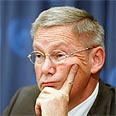
Mehlis: Nasrallah acted with Syria’s approval
German Judge Detlev Mehlis, head of UN investigating team into Hariri assassination, convinced Syria knew beforehand of Hizbullah plot against Israel. ‘Hizbullah would certainly not risk taking the kind of action it has without Syria's approval’
Mehlis told the international German network Deutsche Welle that Hizbullah would not act without Syrian approval, especially when the terror group’s arms are supplied by Syria. “Syria stands by Hizbullah and vice versa. Hizbullah would certainly not risk taking the kind of action it did without Syria's approval,” Mehlis said.
Despite redeploying most of its forces from Lebanon, Syria is still determined to maintian control over its neighbor country, believes Mehlis, an expert on the dynamics and power politics of the region. This became apparent during the investigation into Hariri’s murder, Mehlis said, when undercover Syrian agents interfered with the investigation.
“The Syrian Justice Ministry interfered and frightened witnesses,” he revealed.
According to Mehlis, Syria’s attitude towards Lebanon has not changed in the slightest since it was forced to withdraw its forces under international pressure.
Proxy war
“Syria refuses to this day to establish diplomatic relations with Lebanon. It refuses to recognize a binding demarcation of common borders," he said. "For Syria, Lebanon is nowhere near being an autonomous country."
With that, Mehlis dismisses claims that Hizbullah was conducting a proxy war for Iran and Syria as “speculation.”
So how can the situation be overcome? According to Mehlis, the idea of deploying multinational forces along the Israeli-Lebanese border is an option, but the effectiveness of an international peacekeeping force could be limited.
"The influence of the international community is restricted," he said. "The US has a clear influence on Israel, that is certain. Iran and Syria have real influence over Hizbullah. But whether they can apply enough pressure to stop the assaults, I doubt. I think it's unfortunately going to take some time."
Mehlis believes that owing to the new reality and Hizbullah's increasingly sophisticated weaponry and longer-range rockets, establishing "security zones” would be problematic.
“It could work if Hizbullah had only 20-km (12.5 miles) missiles. But when they have rockets that threaten Haifa and other cities in Israel, the whole equation changes,” he said.










